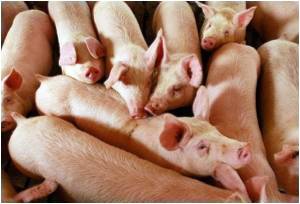Researchers have bred pigs that are not harmed by the the Porcine Reproductive and Respiratory Syndrome (PRRS) virus.

‘Once inside the pigs, PRRS virus takes help from a protein called CD163 to spread in the body. Researchers bred a litter of pigs that do not produce this protein, and as a result, the virus did not spread among the exposed pigs.’





For years, scientists have been trying to determine how the virus infected pigs and how to stop it. Previously, researchers believed that the virus entered pigs by being inhaled into the lungs, where it attached to a protein known as sialoadhesin on the surface of white blood cells in the lungs. However, two years ago Prather's group showed that elimination of sialoadhesin had no effect on susceptibility to PRRS. A second protein, called CD163, was thought to 'uncoat' the virus and allow it to infect the pigs. In their current study, Prather's team worked to stop the pigs from producing CD163. Kristin Whitworth, co-author on the study and a research scientist in MU's Division of Animal Sciences, said, "We edited the gene that makes the CD163 protein so the pigs could no longer produce it. We then infected these pigs and control pigs; the pigs without CD163 never got sick. This discovery could have enormous implications for pig producers and the food industry throughout the world."
While the pigs that didn't produce CD163 didn't get sick, scientists also observed no other changes in their development compared to pigs that produce the protein.
The early-stage results of this research are promising. The University of Missouri has signed an exclusive global licensing deal for potential future commercialization of virus resistant pigs with the Genus, plc. If the development stage is successful, the commercial partner will seek any necessary approvals and registration from governments before a wider market release.
Jonathan Lightner, Chief Scientific Officer and Head of R&D of Genus, said, "The demonstration of genetic resistance to the PRRS virus by gene editing is a potential game-changer for the pork industry. There are several critical challenges ahead as we develop and commercialize this technology; however, the promise is clear, and Genus is committed to developing its potential. Genus is dedicated to the responsible exploration of new innovations that benefit the well-being of animals, farmers, and ultimately consumers."
Advertisement
In addition to Whitworth and Wells, Prather's research team included collaborators at Genus plc, and Kansas State University. The study, 'Gene-edited pigs are protected from porcine reproductive and respiratory syndrome virus' is being published in Nature Biotechnology.
Advertisement












